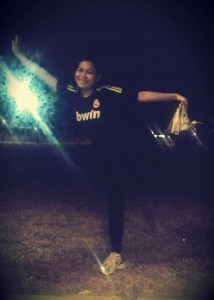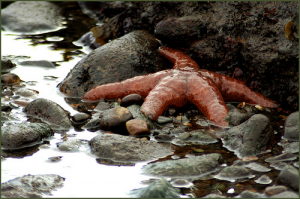Lisa Niver's Blog: We Said Go Travel, page 421
February 13, 2014
Losing time in Peru
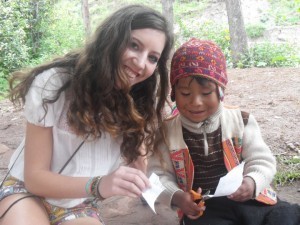 Ibn Battuta once said, “Travel- it leaves you speechless and then turns you into a story teller.” When my feet first touched the ground in Peru, I instantly felt changed. Every single step was culturally enriching, from hiking Machu Picchu, to trekking through the Amazon Forest, to running through the markets of Cusco in the early morning. The food had amazing flavors to it, the people instantly inspired me, and the views had me taking photographs every two seconds- in short, I fell in love with a country, and that country became a part of my heart.
Ibn Battuta once said, “Travel- it leaves you speechless and then turns you into a story teller.” When my feet first touched the ground in Peru, I instantly felt changed. Every single step was culturally enriching, from hiking Machu Picchu, to trekking through the Amazon Forest, to running through the markets of Cusco in the early morning. The food had amazing flavors to it, the people instantly inspired me, and the views had me taking photographs every two seconds- in short, I fell in love with a country, and that country became a part of my heart.
It’s true that traveling leaves you speechless- at times, I could find no words to express the emotions surging through my veins; however, one boy, Jorge, changed everything I ever thought I knew about life, and turned me into the story teller I am today. During my time in Peru, I encountered children every single day. From volunteering at an orphanage in Cusco, to walking down the streets in Lima, there were always children around- playing, laughing, or begging. Jorge, though, was different. I met him while I visited an alpaca farm in Cusco. I expected to learn about how alpaca’s wool was used to create clothing; I never could’ve predicted what actually happened though that day. While on the tour a small boy came up to me. I will never forget the way he looked when I met him. He was dressed in bright attire, the brightest being his smile. He followed the tour group around for a bit, and I couldn’t help but talk to him; he was the cutest child I’d ever seen.
“Hola, como estas?” I said to him, in my best Spanish.
“Hola. Muy bien, gracias,” he replied, in a quiet voice. I didn’t know how to respond next, though, because I wasn’t fluent in Spanish. Because I didn’t know what else to say, I was about to say goodbye, until he held up a book to me.
“Lea, por favor,” he said. This boy wanted me to read to him. So, that’s how two strangers, age four and eighteen, who spoke different languages, found a way to communicate. I read to him for twenty minutes, having completely forgotten about the tour. I could’ve stayed there all day reading to Jorge; his enthusiasm was like nothing I’d ever witnessed before, and it was incredibly contagious.
However, after the story had ended, he took me by hand to his house, which was on the alpaca farm. Again, I couldn’t have predicted what I saw next. Jorge’s house was a small hole inside an old, abandoned, shack. He had a blanket, his book, and a ball. My heart instantly throbbed, thinking of all the unnecessary possessions I owned, compared to what this boy had. It was absolutely shocking. We played catch with his ball for a bit, and then I took my notebook, scissors, and markers out of my bag. Jorge’s face instantly lit up, and my heart warmed this time. We drew pictures together, and enjoyed the afternoon.
In Peru, nobody wears watches, and no one is a slave to a schedule. It’s the most serene feeling I’ve ever experienced. However, as the sky started to take on shades of pink and orange, I realized that I had to leave in order to catch the train back to town. Though I’d only known this boy for one day, it was one of the hardest goodbyes I ever had to say. I gave him my notebook and markers, and through his hug I could understand words that were not spoken. He tried to give me his ball and his book in return, but I couldn’t accept them. For the second time that day, my heart throbbed. A boy who owned next to nothing was the most generous person I’d ever met. I wanted to give him the world, but all I had was a notebook and some markers. As he walked me to the train, again by hand, he spoke three words, of which I understood perfectly.
“Por favor vuelve.” Please come back. With tears in my eyes and my throat tightening, I nodded, and gave him one more hug. As I boarded the train, I felt such an overwhelming amount of sadness for having to say goodbye to this little boy; however, I also felt happiness and pride in knowing such a selfless, and sweet child. Because I met Jorge, I don’t care about possessions so much as memories. Because of Jorge, I have a thirst to travel more that can’t be quenched. Though I had arrived at the alpaca farm for a tour, I immediately realized that my time would be better spent getting to know this boy. I don’t regret any of it.
About The Author: My name is Barbara Anne Scheibel, and I am a Childhood Education major at SUNY Oswego. It was my experiences with children in Peru that inspired me to become a teacher. I love writing, traveling, and helping others- especially children.
Thank you for reading and commenting. Please enter our next Travel Writing competition and tell your story.
The post Losing time in Peru appeared first on We Said Go Travel.
Batanes, Philippines: Heaven on Earth
Kapian capa nu dios Batanes! (Hello Batanes!).
First, I write to you as a hopeless romantic. No! Not the kind of I am looking for a happy ever after, waiting for my prince charming. I am in love with your beauty. You are a piece of heaven on Earth.
My fascination about you started when I was in college. My best friend and I saw you in a travel magazine. Since then, I never stopped dreaming about you. I included you (BATANES) in my bucket list – a place I will never ever regret to set my foot on. My best friend and I promised to visit you together. But sadly, she saw you first without me. I was a bit jealous because she even had the chance to be with you for a year. Well, our dream of seeing you together didn’t end there. She told me that you do exist, you are real. And that one day we`ll see you together.
I’ve seen your breathtaking beauty in travel magazines and in the internet. You are truly majestic. A place that inspires me to appreciate my life and don`t regret it. I am lucky that I have given a full eye sight to see your beauty. You are isolated from the main body of the Philippines. Seeing you could really be expensive, and is more costly than travelling to any other Asian tourist destinations. But I know that you are totally worth it.
You inspire me to be closer to nature. To appreciate the small things that is actually the big things essential for us, humans. I want to be one of those few who have seen your breathtaking beauty. You are a gift of Mother Nature. I must see you before I die. You inspire me to explore, do more, enjoy and diverse myself in different culture. You inspire me to leave behind the comfort of our home and experience the random acts of kindness of your people, the Ivatans. One thing I am sure of – if I don`t see you I haven`t lived a full life (that is my regret).
I want to tour around your majestic scenery on a bike ride. To hike on your beautiful rolling hills, take a photo on your picturesque coasts, pray in your unique old churches. I want to breathe your wild air and feel it on my face. To chase sunsets and woke up in your cold breeze.
I will not have forever so I don`t want to waste my time on Earth not to set foot on you. I will see you soon. Ichaddaw ku imu (I love you) Batanes!
With Love,
Your Lover
About the Author: I’m Mara Eclio from Manila, Philippines. I am a dreamer and a work in progress.
Thank you for reading and commenting. Please enter our next Travel Writing competition and tell your story.
The post Batanes, Philippines: Heaven on Earth appeared first on We Said Go Travel.
My Union with Nature in Rishikesh, India
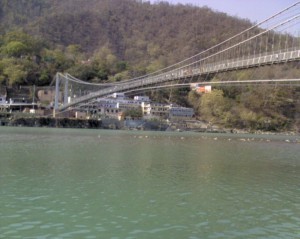 Sitting beside the River Ganga, I like to watch, with awe, the continuous flow of this holy river that kisses the banks of the adjoining town of Rishikesh. I have often traveled to this Hindu-dominated, spiritual town, which is located at the base of the largest mountain range in the world i.e. the Himalayas. The place seems to have transcended time, and I try to merge with the eternity every time I gaze at the river water flowing incessantly, crossing the rocks that try to impede the continuous flow of water. Sometimes, the stream is powerful enough to jump over these natural hurdles, while at other times, it takes the less rigid course. I find nature has a lesson for me, and this teaching occurs simply by observation and analysis. I wouldn’t get these practical lessons in a tense, smoke-friendly management setting, but I imbibe these priceless lessons in a relaxed, serene environment in Rishikesh.
Sitting beside the River Ganga, I like to watch, with awe, the continuous flow of this holy river that kisses the banks of the adjoining town of Rishikesh. I have often traveled to this Hindu-dominated, spiritual town, which is located at the base of the largest mountain range in the world i.e. the Himalayas. The place seems to have transcended time, and I try to merge with the eternity every time I gaze at the river water flowing incessantly, crossing the rocks that try to impede the continuous flow of water. Sometimes, the stream is powerful enough to jump over these natural hurdles, while at other times, it takes the less rigid course. I find nature has a lesson for me, and this teaching occurs simply by observation and analysis. I wouldn’t get these practical lessons in a tense, smoke-friendly management setting, but I imbibe these priceless lessons in a relaxed, serene environment in Rishikesh.
I am not an expert at doing yoga or meditation though I have tried several times and achieved partial success in realizing my inner peace. This place, which is considered as a holy place and the Mecca of spirituality, makes me forget my superficial existence as I endeavor, without any kind of coercion, to attain my natural state of spiritual existence. It is here I realized that I have a material body inside which lives the metaphysical spirit somewhere in the brain and in the middle of the forehead. What a joy it was for me to realize that heart is only a physical organ having the sole function of pumping blood in the human body. It was in my deep state of thinking here that I found the way to experience bliss through my own mind – something that I was afraid of – all my life.
The pleasant voice of the river stream resonates in my ears and seems to tickle me. The white froth – emerging by the impact of river water against stubborn rocks – seems to awe me. The swinging bridge known as the Ram Jhoola seems to invite me to enjoy the gently swing on it. I am no more bothered when a starving street dog comes in front of me, tries to catch my attention and sits next to me like a friendly companion. I am no more annoyed by these disturbances here. Perhaps it is the magic of the holy mantras recited by sages in the spiritual ashrams.
I call it, truly, a democratic place where man, animals, vegetation, river, and mountains live in harmony. As I walk on the street, there a couple of cows and buffalos marching freely on the narrow road – having ashrams on one side and the river bank on the other side. There is a clear mutual understanding between all living souls here, and nobody feels threatened, if the common public space is used slightly more by another fellow being.
If you were to see non-violence being practiced in reality, then you would see it here at Rishikesh. All restaurants serve only vegetarian food, and that means – no eggs either. If you were to witness simplicity of human character, then you would observe it in the sages living inside the ashrams at Rishikesh. Since I realized my innate spirit, happiness, love, peace, and contentment in Rishikesh, I know how it feels to surrender completely to time because my spirit is timeless; it is past, present, and future. As I look at the blue sky above me, I see a host of sparrows flying freely – without any bondage to space and time. I also let my spirit cross the mind and realize its natural freedom, which was gifted to me by the creator, but it got entangled in the material world. I am able to realize my true identity every time I hug and unite with nature in Rishikesh.
About the Author: Sandeep Sinha has traveled 17 countries in Asia, Europe and North America over the past 21 years. He loves writing on travel, spirituality and poetry.
Thank you for reading and commenting. Please enter our next Travel Writing competition and tell your story.
The post My Union with Nature in Rishikesh, India appeared first on We Said Go Travel.
February 12, 2014
The Red River Gorge in Kentucky
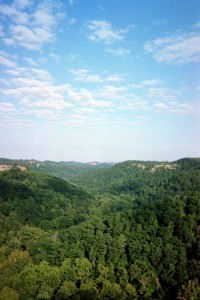 I remember vividly the first time I heard Avicii’s song “Wake Me Up.” I was riding from Grand Rapids, Michigan to Red River Gorge, Kentucky (The Red) with a bunch of fellow in-coming college students. The song created a new atmosphere in the van, everyone smiled a bit more and happiness seemed more alive. At the hard beats of the drums and base, no one could help a little nod of their head or a little dance. Every time, I hear that song and the music cuts, then crescendos into a strong base beat, I can feel Maaike there beside me in the van fist pumping so hard that she’s shaking the whole van.
I remember vividly the first time I heard Avicii’s song “Wake Me Up.” I was riding from Grand Rapids, Michigan to Red River Gorge, Kentucky (The Red) with a bunch of fellow in-coming college students. The song created a new atmosphere in the van, everyone smiled a bit more and happiness seemed more alive. At the hard beats of the drums and base, no one could help a little nod of their head or a little dance. Every time, I hear that song and the music cuts, then crescendos into a strong base beat, I can feel Maaike there beside me in the van fist pumping so hard that she’s shaking the whole van.
Whenever I hear that tempo and the voice of the singer, the strings plucking then the base beating strong, images of that trip come back to me, taking me out of the present and into the past.
Everyone else asleep, the night dark as we begin to enter the mountains, and the stars shifting behind the tall peaks. Me, looking up at the sky and feeling my strong passion for mountain landscapes. My heart singing along to the words, “I tried carrying the weight of the world, but I only had two hands… Wake me up when its all over,” let me live in the moment and forget all of my worries for now. At that moment, I lost all sense of time, all pressures and stresses of the world, and I wouldn’t gain them back until I stepped out of that van and onto campus after the trip.
There were other songs, too, that we listened to a lot in the van, but “Wake Me Up” is the one that captures the trip and brings back not just vivid memories but emotions. Flashes of rocks taller than you can see with long ropes dangling from some destination unseen. The faces of my friends and companions that became so even before the first night. The smiles, the adventure, the adrenalin, the wilderness: that’s what the song captures in my heart, the true meaning of that trip.
“Wish that I could stay forever this young, not afraid to close my eyes!” I cherished every moment and that’s how one truly lives, with no fear, no plans, no worries. I took risks, safe risks. I climbed higher and harder than I ever have. Climbing is exciting, exhilarating, and puzzling. One has to think when climbing: what moves to use, how to position one’s body, where the holds are, how to find a path and reroute, determining what’s safe and what’s worth the risk.
One night, after a great day in the mountains, the girls around me were all asleep, but I just lay there on my mat, looking up at the stars through the screen in the tent roof and not thinking a single thing, just smiling and relishing the feeling within me of pure joy. It was a feeling of knowing that this was the place and moment where I belonged, and nowhere else would be right at that moment. The night was warm but not so much that I couldn’t sleep. The sounds of crickets and frogs filled the air as I lay there on my back with my hands under my head, my stomach full of a great dinner, and my body clean and cool from a fresh shower. I felt deeply connected to each of the girls around me and even more so to the landscapes surrounding us.
The mountains rolled over the land stretching valleys far below. Trees blanketed the landscape in a fuzzy green broken only by the towering orange-brown of majestic sandstone cliffs and arches. As we trekked through the undergrowth of towering trees, it seemed as if we were in a jungle. The plants so abundant and vibrant that it appeared more so that the trail was infringing on the plants than the reverse. Civilization seemed to be a fantasy in the midst of this great wilderness.
When we drove home after a week, whenever our song came on, it would revive my feeling of freedom and The Red that was fading with every mile that we came to the real world. I could feel each item of stress coming back to my shoulders, and I didn’t want it. I wanted to stay in the wilderness forever. When I got back on campus, I listened to “Wake Me Up” on repeat for a half an hour or more at a time, my eyes closed and my heart beating to the rhythm of The Red.
“All this time I’ve been searching for myself, but I didn’t know I was lost.” Isn’t that so true of me on this trip. Maybe I didn’t find my career path and all the answers to my problems, but I found myself again. I decided that I travel not to get away, rather to return to myself.
About the Author: Stephanie Bradshaw is a Calvin College student studying Writing and Geography. I love to travel and have been all around the United States and also to Italy, Greece, Canada, and Mexico.
Thank you for reading and commenting. Please enter our next Travel Writing competition and tell your story.
The post The Red River Gorge in Kentucky appeared first on We Said Go Travel.
No Regrets in London, The UK
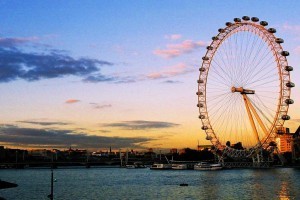 Regrets are a funny thing. The people that I have surrounded myself with influenced the decisions I have made and have caused me the inexplicable pain of making an important choice. Life altering choices. This is how I find myself sitting in the proverbial heart of the United Kingdom.
Regrets are a funny thing. The people that I have surrounded myself with influenced the decisions I have made and have caused me the inexplicable pain of making an important choice. Life altering choices. This is how I find myself sitting in the proverbial heart of the United Kingdom.
I sit in a glass orb, crammed with several people. A large portion of them are tourists, including the Americans with expensive cameras hanging from their necks, those strange looking pouches encircling their waists that hold their precious cash, keeping the dirty hands of thieves away from their overly large pockets. Then there are those European travelers. You can tell the difference between them and the Americans from their mannerisms and the thick accents of their voices when they speak, staring at the Americans in disdain.
I laugh silently to myself. How odd I must look, sitting in a corner by myself, staring out at the glistening water, the buttery sunshine that shone through the glass warming my skin, even though the warmth would depart soon with the oncoming sunset. Me, a young girl, sitting in one of the glass enclosures of one of the most famous Ferris Wheels in London, all by herself. They may think, “Does she not have parents? A boyfriend?” then again, they may not even notice me at all. Tourists tend to be unobservant in that way, too enraptured by the beauty of the city they are seeing, which is understandable.
We may all be different, but the one thing that all of the people sitting in this glass ball has in common, is their love for this city. The disdain for one another can easily be forgotten when we all share a moment of awe and wonder for being in such a magical and inspiring place, making our hearts soar with contentment. That is, for one who appreciates the beauty of a place such as this.
In a sense, you can say I ran away from home. All throughout high school my parents had a dream for me. Get straight A’s, go to a preppy Ivy league such as Yale or Harvard, play your cards right, and you will do well. But then again I say, that was my parents dream. They never bothered asking me if it was mine. So I labored through high school, taking all AP classes and getting a part time job at the local thrift store. I really tried to do what I could to make my parents happy. Then I came to a realization a bit late in the game of life. On my graduation day actually. I had been accepted to Yale, Columbia, Princeton, Harvard, the works. I was valedictorian, and my I could see my parents beaming with pride.
During my speech, where I spouted the usual garbage everyone expects to hear, my closing statement really hit home. “Everyone has a choice in life, a choice of which direction to take. To live out a life of their own, or to live out the life planned for them. Now, the real question is, what is the difference between the route they should take, and the one they want to take? In the end, will you choose the route that is best for everyone, or the route that you know is best for yourself?
I wrote this sentence, not realizing how pertinent it was to my life. That night after a dinner of fake smiles and talk of college, I finally realized what I wanted, and which route I would take. That’s how I found myself booking a one way ticket to London with the cash I earned from my part time job. I took the keys, haphazardly packed my things, and fled into the night.
Was it necessary to do such a drastic thing, to leave and leave only a note, saying “I want to live my life my own way.” Maybe not. Maybe I was too dramatic; I couldn’t even bring myself to care. The orb came to a smooth stop above the ground, and I got off, waiting for the shoving tourists to depart.
I went and stood in front of the body of water, shimmering, as if winking at me, a sign telling me I made the right choice. As the sun went down and day transitioned to night, the stars twinkling at me, making the scene even more beautiful, I looked out over the city of bustling people on the other side of the lake and whispered to myself, a real smile on my face for the first time in years, ready to begin my new life. “No regrets.”
About the Author
My name is Stephanie and my dream in life is to become a writer. I love London and everything about it, from the beautiful scenery to the interesting people. Music is a crucial part of me and my life, and i hope to inspire people to do great things with my writing.
Thank you for reading and commenting. Please enter our next Travel Writing competition and tell your story.
The post No Regrets in London, The UK appeared first on We Said Go Travel.
Secret Beach in British Columbia, Canada
Secret Beach
My dreams spread across the sheet, each fragment captured in its own little box: Moraine Lake; the Saskatchewan River Crossing; The Athabasca Glacier; Sunwapta Falls; Maligne Canyon; Tofino; Clayoquot Sound; Ucluelet; Vancouver. I savoured each name on my tongue – some smooth as New World silk, others rough as the cedar bark cloth woven by the First Nations people.
A hundred years earlier, Charles Melville Hay had dreamed of a single place: Prince Rupert. Our dreams would take us both there – but separated by a century. With the deepest ice-free natural harbour in America, Hay envisioned Prince Rupert linking his continent with Asia by rail and ship on a scale that no one had ever imagined. He travelled to Europe, seeking support for his venture before boarding his ship for home.
His ship was called The Titanic.
Then our own ship sank one dark rain-swept night in March.
The Queen of the North was to have taken us from Prince Rupert along the Inside Passage to Vancouver Island. I gazed at my spread-sheet in dismay, the fabric of my dreams in tatters. Would we have to reroute? Weave new dreams? BC Ferries had one remaining ship. We were placed on a waiting list. At last we were told we could sail – but with 3 days waiting in Prince Rupert.
Summer arrived. We arched the roof of the world in a silver bird. The black and white boxes of scripted dreams took colour and substance. We drove across the Canadian wilderness and along the Skeena River until we were halted by the Pacific Ocean. It felt as if we had reached the end of the earth. Fifty nautical miles to the North lay Alaska. The nearest town, Terrace, was two hours back. Vancouver was two whole days away by boat and road.
On the first day, we explored Prince Rupert: The little quay, the sunken garden, the grid roads, and square shed-like buildings.
On the second day, we visited the laundrette.
On the third day, we had exhausted Prince Rupert and all it had to offer.
At the Tourist Office, I requested a sandy beach, pointing to my children, and the girl obligingly drew us a map.
The map led us to the edge of town, where we found the brave new world of Hay’s dreams – a colossal shipping terminal. Rows of capacious grain silos stood sentry on the shoreline; tower-mounted loading spouts clawed the sea like monstrous robotic arms; mammoth metal sheds scraped the pale northern skies, cold cathedrals to commerce. The place was deserted, yet there were signs of recent activity: mountains of quarried stone; abandoned bulldozers; fresh caterpillar tracks in the soft ground.
At the far end of the terminal, we came to a dirt track. A rusting gate barred our way. A makeshift sign warned, “PRIVATE. TRESPASSERS WILL BE PROSECUTED”. The air hung iron-heavy. Lifeless.
“This is it,” my husband said firmly, tapping his finger on the map. We deliberated. Then uneasily but defiantly, climbed the gate. We trudged the interminable potholed track lined with weedy shrub. A brightly-coloured hummingbird lay dead on the path, contrasting the grey mud-cracked earth. Of the sea there was no sign. Our uneasiness grew.
We almost missed it – the narrow half-rotten plank that bridged a babbling brook running aside us. We pushed through dank undergrowth and tumbled onto the shore.
Nothing had prepared us for the world that revealed itself to us.
In front of us, a sandy spit strewn with Herculean redwood stumps stretched out to a wooded islet. Wandering into the trees, I stumbled on a fishing-net hammock swaying gently in the Pacific breeze. Further in, a swing roughly fashioned from fishing rope and driftwood, creaked to the slow rhythm of the tide. On the shore, a forty foot trunk bridged the maw of a jagged cove.
Where was this? A natural seashore playground? A secret shoreline garden?
I listened to the faint whoop of my children through the whoosh of the surf as they made abstract Hepworth sculptures from giant logs on the beach.
Happiness crept in and curled up beside me.
I lost myself in tidal pools of aqua-marine anemones, sea-green starfish and burnt-sienna crabs. Once I thought I saw a shadow on the shore-line. There, then gone. Bear? Wolf? Human?
Time slipped away: the past, the future and the present too. And the pale sun hung frozen, suspended in the cool Canadian air.
A thousand afternoons in one and time returned. The sun slithered off the sky. Shadows lengthened. Darkness threatened. We had to leave.
Homeward bound, I thought how the sunken ship had forced us to stand still on the journey; led us to an unlikely corner. Then it came to me: the best journeys in life are unplanned and unexpected.
About the Author:
Helen Moat spent her childhood squished between siblings in her Dad’s Morris Minor, travelling the length and breadth of Ireland. She’s still wandering. Helen was runner-up in 2011 British Guild of Travel Writers Competition and was highly commended in the BBC Wildlife Travel Writing Competition this year.
Thank you for reading and commenting. Please enter our next Travel Writing competition and tell your story.
The post Secret Beach in British Columbia, Canada appeared first on We Said Go Travel.
February 11, 2014
Stone Towers Of Mount Svaneti, Georgia
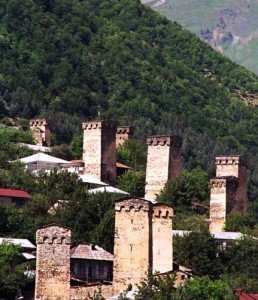 Leaning forward, holding tightly to the roof beams, we poked our heads out of an 800-year-old stone tower in the country of Georgia. From our vantage point some 25 meters above the ground, we saw scores of other ancient stone towers scattered throughout the village of Mestia, Svaneti’s regional capital.
Leaning forward, holding tightly to the roof beams, we poked our heads out of an 800-year-old stone tower in the country of Georgia. From our vantage point some 25 meters above the ground, we saw scores of other ancient stone towers scattered throughout the village of Mestia, Svaneti’s regional capital.
The gently sloping valley, carpeted with green hay fields, contrasted strikingly with the immensity of the lofty snowy summits that soared up around us. We were captivated by this ancient place, feeling that somehow we had stepped back into the Middle Ages. Visiting the famous stone towers of Svaneti had, in fact, been a goal of our trip.
Our journey to the high mountain area of Svaneti began in Zugdidi, Georgia, near the Black Sea. The morning was clear, and from there we could already see the magnificent white peaks. When we reached the Inguri River George, we slowly wound our way through it. This forest area teems with ferns, azaleas, laurels, and masses of rhododendrons with cream-colored blossoms.
By evening, our group had reached the picturesque village of Becho. It is located at the foot of the breathtakingly beautiful Mount Ushba, with its towering twin granite spires. Like moth to a candle flame, mountain climbers are drawn to the sheer icy peaks of Mount Ushba. At 4,710 meters, it is usually referred to as ” the matterhorn of the Caucasus.
Tired and hungry from our travels, we stopped a local shepherd, bought a sheep from him, and prepared it for supper. Before long, over a camp fire and with the kind hospitality of our Svan friends, we had a wonderful dinner of Mtsvadi, known to many as Shish Kebabs. It was served with freshly baked Georgian-style lavash, a flat bread prepared in a wood-fired clay oven. To top off the meal, we enjoyed glasses of Saperavi, a rich, dry red wine native to Georgia.
The next morning, our journey took us to Mestia where we arrive another stone tower. Here, looking out from the stone tower, we concluded that Svaneti is one of the most beautiful mountain regions of the world. Some 45 kilometers from Mestia, nestled still deeper in the mountains, is the village community of Ushguli. Villagers here live at the altitude of up to 2,200 meters. Ushguli has been called “the highest continuously inhabited village in Europe.”
To reach this mountainous community, we took a lonely, narrow road that clings to the mountain and is bounded by steep precipices that drop off to the river below. On finally reaching Usguli, we were rewarded with an unforgettable sight; clusters of houses huddled around Medieval stone towers. The backdrop was the immense Mount Shkhara. Its dazzling white snowy mantle contrasted beautifully with the deep blue of the alpine sky.
At 5,201 meters, Mount Shkhara, Georgia’s tallest mountain, is part of what is called Benzegi Wall, a 12-kilometer line of peaks that reach almost the same height. These are part of the some 1,207-kilometer-long Greater Caucasus range. Everywhere we looked we saw lush valleys with outstanding scenery. Yet, these valleys are inaccessible, except to the most adventuresome or to those who call Svaneti their home.
The Svans who live in upper Svaneti, are an ancient people who have their own language. They have long been known as people who refuse to be dominated by any lord. In the 18th century, an explorer observed that the Svans had “realized the new idea of a society where the free-will of the individual overrides all other considerations.”
The unique freedom of Svaneti can be attributed to two factors. First, the barrier of extremely tall mountain ranges isolate the people from the outside world and protects them from invaders. Second, the stone towers serves to safeguard the independence of each family. It protects them against enemies and neighboring villagers, who at times become hostile, as well as from avalanches that inundates smaller structures with snow. One visitor in the 19th century reported that since there was “no local authority of any kind able to enforce decision, arms were constantly resorted to.” So each family was prepared to fight to defend itself.
On our return home with a time well spent without regrets and knowledge of this ancient place, feelings of inspiration and gratitude welled up in our hearts as we reflected on the beauty we had seen in Mount Svaneti. “Those who lived in the stone towers there in bygone ages have the prospect of life in a new world,” we concluded.
Thank you for reading and commenting. Please enter our next Travel Writing competition and tell your story.
The post Stone Towers Of Mount Svaneti, Georgia appeared first on We Said Go Travel.
Such Is Life in Australia
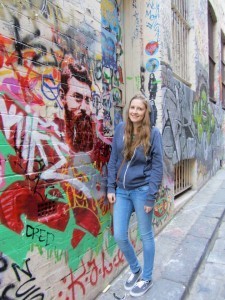 Undoubtedly one of the most memorable moments of my five week trip to Australia last summer was in Melbourne where on a free walking tour we heard about Ned Kelly- one of the most famous figures in Australian history and a national hero. He is best described as the ‘Australian Robin Hood,’ who caused much controversy by his stand against the corruption surrounding the police force and British colonialists of the time. To some he is nothing but a lawless thug, but to many he stood for the Australian everyman, he symbolised honour and took a stand against injustice in the establishment. When hearing his story while standing in the Old Melbourne Gaol where after his capture he was eventually hung for his crimes, I didn’t realize the significance of one singular man on a country until I was walking around the city later that day.
Undoubtedly one of the most memorable moments of my five week trip to Australia last summer was in Melbourne where on a free walking tour we heard about Ned Kelly- one of the most famous figures in Australian history and a national hero. He is best described as the ‘Australian Robin Hood,’ who caused much controversy by his stand against the corruption surrounding the police force and British colonialists of the time. To some he is nothing but a lawless thug, but to many he stood for the Australian everyman, he symbolised honour and took a stand against injustice in the establishment. When hearing his story while standing in the Old Melbourne Gaol where after his capture he was eventually hung for his crimes, I didn’t realize the significance of one singular man on a country until I was walking around the city later that day.
Melbourne is most recognized internationally for its rich culture and art scene. Street art is held closely to the heart of the city, most perfectly expressed on Hosier Lane, where down the whole lane every wall and building is covered with graffiti. Each piece individually different, with hidden meanings and political messages, but looking at the top of the street looking down all you see is a blur of colour that is so modern yet so beautiful. Though the artworks were so unique and constantly changing due to new graffiti artists spraying their ideas over the space, one face was particularly prominent. A stencil of Ned Kelly’s face was spray painted multiple times down Hosier Lane and throughout the rest of the city. Over a hundred years on, a poor Irish bushranger is still remembered.
Though Melbourne was the first stop of our five-week trip backpacking up the East Coast of Australia, the story of Ned Kelly followed us up as he encapsulated the feeling of the country. Laidback, decent and an altogether ‘good bloke’ Ned Kelly was the everyday Australian man. His humour defined the country, as a heavily sarcastic, dark banter filled every Australian city and town we visited. The stereotype of an Aussie man is a bronzed surfer with a beer permanently in his hand coming out with phrases such as ‘G’day’ and forever putting ‘shrimps on the barbie.’ On arriving, I obviously did not encounter this, however I was met with laid-back, hilarious and definitely tanned individuals whose positively and love of life was inspiring.
Famously, when Kelly was asked before his execution if he would like to say any final words, he responded, “Such is life.” It wasn’t long before this became the mantra of our trip, with the three words defining a country that is impossible not to fall in love with.
About the Author: Ailish Saker.I am currently a student of American Studies living in Brighton with a passion for travel. I spent my last summer in Australia and this August I will be moving to Michigan, USA to study for a year.
Thank you for reading and commenting. Please enter our next Travel Writing competition and tell your story.
The post Such Is Life in Australia appeared first on We Said Go Travel.
February 10, 2014
Make No Small Plans for Chicago
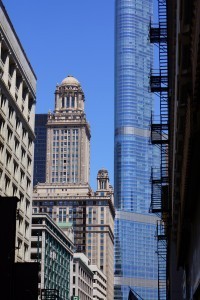 Make No Small Plans – or How I Learned to Love Home
Make No Small Plans – or How I Learned to Love Home
I was chatting late with a boyfriend one night. We were up in the balcony of the Improv Comedy Club in Chicago. Yup – that’s the one – with the red brick wall and a microphone. I worked in the box office there and it was the best job I’ve ever had. Still, to this day, best job I’ve ever had.
So he and I were in the balcony, asking each other relationship questions and he says: “If you could live anywhere in the world, where would you live?” Not a second went by, not an intake of breath before I blurted out, “here. Chicago. I would live here.” He looked at me expectantly, hoping for maybe “a 3 story loft in Soho” or a “run away and live on the beach in Tahiti.” I explained as simply as I knew how that if I wanted to live somewhere else I would live there. He couldn’t believe my answer. We didn’t make it he and I, but my love affair with Chicago is as strong as ever.
It may seem biased, my love for Chicago. I have lived in other cities. I lived in Boulder, Indianapolis, then I moved home to Chicago. I lived in New York for a time, then I moved home to Chicago. I’ve visited and spent good time in some of the great cities of the world: Saigon, San Francisco, Lucerne, Paris, Rome. Barcelona was so amazing, full of art, energy, food and wine. Chaos and order both rule the streets of Bangkok, as scooters and pedestrians move together like a school of fish. Phnom Penh staggered me with it’s tragic history and it’s heroic struggle to rise again.
I love cities, all of them. I love the symphony of ideas that somehow come together for a city to erupt from the earth. The effort it takes to just even put one building together, much less miles of them – I’m amazed any building gets built at all.
Chicago is a new city, the youngest in a world-wide family of great cities. Much like the youngest child, Chicago is the amalgam of the cities that came before it. There are elements of Paris in our bridgehouses and boulevards. Doric and Corinthian columns decorate our skyscrapers. Our famous Wrigley Building is the 1st cousin of the Koutoubia Mosque in Marrakesh. Artists and architects from all over the world have brought their beauty to this most American of American cities.
There are countless stories of Chicagoans who were told their ideas were crazy, William Wrigley and his silly sticks of gum; William Le Baron Jenney who had a crazy idea to rest a building on a steel frame and call it a skyscraper; a young fellow by the name of George Washington Ferris who wanted to build a spinning wheel. We’ve been teased for being unsophisticated, too brash, too corrupt, too boastful. But I will always root for the underdog – it’s my midwestern values.
About the Author: Margaret Hicks is a tour guide, comedian and traveler.As a traveler, I spend much of my conscious time in wanderlust. I want to go, see something new, something different. It’s easy to regret time spent in the wrong place. Time laughs at travelers, as we fret about one more day in a town when there’s another one right around the corner. I must see the world; it is fixed in my genes that I must keep moving. But the one place I can stop, take a deep breath, find my footing and learn to stand as tall as the buildings around me, is Chicago. Is home.
Thank you for reading and commenting. Please enter our next Travel Writing competition and tell your story.
The post Make No Small Plans for Chicago appeared first on We Said Go Travel.
Govardhan Hill, India
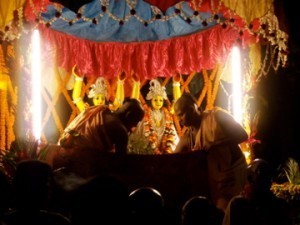 The ground is packed down hard yet dusty from many wheels, hooves, paws, and bare feet like mine as I absentmindedly careen around piles of dung, sleeping dogs, and empty banana leaf bowls once filled with sweet rice. These bowls of sweet rice are given out free by street vendors to those going on this holy walk; hospitality seems to be common place here in India to those who follow their spiritual path towards whatever God they believe in. It’s 2 a.m. and I can’t believe so many people are still awake at their good-selling stands watching the hundreds, maybe thousands of people go by. I suppose if your bed and booth are one and the same you might as well stay up as long as there are potential sales to be made. I’m starting to feel my feet so I pad down a little softer. The varying terrain of dirt, paved road, rocks, and sand has sent my unaccustomed-to-being-without-shoes soles into a quiet protest—reasonably so, for my feet and I must have walked about nine miles and five hours now. We are making our way towards Radha Kund, an important stop on this 13-mile circumambulation. Saraswati, the girl I have been walking beside bursts out, “we are walking in the dust of the most sacred hill in the most sacred city of Mathura! In India, the most sacred country in the world!” and puts her hands up while closing her eyes. I turn my face forward, wide-eyed, and wonder to myself what I am doing here. Even in places where there are no buildings and no lights, the full moon shines on everything so bright.
The ground is packed down hard yet dusty from many wheels, hooves, paws, and bare feet like mine as I absentmindedly careen around piles of dung, sleeping dogs, and empty banana leaf bowls once filled with sweet rice. These bowls of sweet rice are given out free by street vendors to those going on this holy walk; hospitality seems to be common place here in India to those who follow their spiritual path towards whatever God they believe in. It’s 2 a.m. and I can’t believe so many people are still awake at their good-selling stands watching the hundreds, maybe thousands of people go by. I suppose if your bed and booth are one and the same you might as well stay up as long as there are potential sales to be made. I’m starting to feel my feet so I pad down a little softer. The varying terrain of dirt, paved road, rocks, and sand has sent my unaccustomed-to-being-without-shoes soles into a quiet protest—reasonably so, for my feet and I must have walked about nine miles and five hours now. We are making our way towards Radha Kund, an important stop on this 13-mile circumambulation. Saraswati, the girl I have been walking beside bursts out, “we are walking in the dust of the most sacred hill in the most sacred city of Mathura! In India, the most sacred country in the world!” and puts her hands up while closing her eyes. I turn my face forward, wide-eyed, and wonder to myself what I am doing here. Even in places where there are no buildings and no lights, the full moon shines on everything so bright.
I came here with the purpose of understanding my father’s religious beliefs in Chaitanya Vaishnavism, or the Hare Krishna movement. It is the first night of the month of Kartik, the most auspicious month of the Hindu calendar, when offerings to Krishna have an amplified significance. All of my surroundings have the amplified significance of novelty, as I have only been in India for three days. I am performing this Parikrama, the act of walking a path encircling something holy, around Govardhan Hill with my father’s ex-wife, Malati, and other devotees, but I don’t really understand anything. Beggars are lining the streets with deformities obscured in moonlight, grabbing at my ankles while I am pulled forward and told to ignore their pleas. People ahead begin to drop to their knees in quick prayer as the slope of the hill comes into unimpeded view. Face down with palms pressed muttering mantras, and we pour around them like boulders in our current. One, a man in child’s pose moving stones with one arm from a pile behind his feet to a pile ahead, pins me. Malati stops beside me pointing, “there are 108 stones in that pile.” Once the pile of stones behind him is depleted he stands with his palms together, steps in front of the newly completed pile, returns to child’s pose and begins the whole process again, chanting in prayer all the while. “That man will move those 108 Goverdhan rocks all the way around the hill as we’ve walked it. Just like that, the whole way.”
There is no sleep for this man until he has made his full Parikrama of Goverdhan Hill, yet I sense neither lethargy nor haste. The ever-needy clawing of the body falls away under this immersion in devotion. Walking on, I am forced to question the pace of my own feet. When was the last time I was able to allow for such emptiness? I find myself constantly striving to impregnate every moment with productivity, with motion, with experience. Looking to fill the next before the present has passed—a kind of experiential hyperventilation, inhaling without exhaling. Turning back for one last look, I don’t sense emptiness, but fullness.
Once at Radha Kund, a body of water fabled to be where all of India’s sacred rivers meet, Malati points to a building and says, “This was one of your father’s favorite places. He lived up there on the second story. It was special to him.” She hands me a small banana leaf bowl filled with a lit piece of waxed wick as an offering and turns away. I yearn to summon a fraction of the power of the man with the stones to immerse myself in something I’m not sure of. I want this moment alone with my father’s presence to burst beyond the confines of what seconds can hold. When I time my breathing just right, the seconds fill themselves.
About the Author: Dominique Edgerly is a 25 year old middle school science teacher and outdoor educator/wilderness trip leader who has been fortune to be able to travel through five different continents in the past five years. She is passionate about meeting people with different perspectives, writing, photography, and outdoor activities of all forms. She is in the process of assembling a family narrative that has left pieces all around the globe.
Thank you for reading and commenting. Please enter our next Travel Writing competition and tell your story.
The post Govardhan Hill, India appeared first on We Said Go Travel.
We Said Go Travel
We Said Go Travel is a global community of over sixteen hundred writers with articles from every continent.
Stories are shared with photos and video from a perspective of the transformative power of travel. We Said Go Travel has hosted live and online events as well as travel writing contests around the world. ...more
- Lisa Niver's profile
- 57 followers


